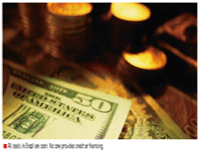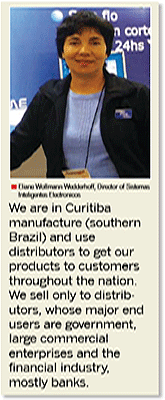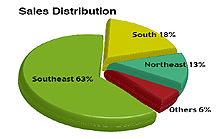Brazil throws up a bewildering picture when it comes to distribution. Rather than a unified whole, the industry presents a chaotic mix of competing distributors fighting over markets. Finding a local partner is, therefore, absolutely essential in navigating these difficult waters.
Brazil throws up a bewildering picture when it comes to distribution. Rather than a unified whole, the industry presents a chaotic mix of competing distributors fighting over markets. Finding a local partner is, therefore, absolutely essential in navigating these difficult waters.

In Brazil, pointed out Sergio Mendes, owner of Sektronix, the largest distributor in Minas Gerais, "the distribution market is a mess." According to Mendes, the market in the U.S. is much better regulated and controlled, with different distributors respecting other distributors' territories. That is not the case in Brazil. "Here, you have two or three distributors for the same company competing directly against each other, often undercutting each others' prices!" For system integration, the market is also very fragmented, with many local players dominating their respective markets.
"Most security electronic products in Brazil," said Eytan Dikstein, Director, Risco Group, "are imported, but there is a confusing mix of licensing and incentives from state governments that govern licensing and importation. Some states, for example, may specialize in certain product categories; so it may be more beneficial to import those products into those states." This confusion and lack of hard data extend to total market size. "There is no institute in Brazil that has been set up to gather these figures; nor are those that focus on the electronic security business capable of doing soat least not accurately," noted Daniel Kim, General Manager, Kodo.
Despite partial liberalization in recent years, said Marina Konno at the U.S. Commercial Services, "the complexities of Brazil's business environment still create substantial obstacles. Doing business in Brazil requires intimate knowledge of the local environment, including explicit as well as hidden costs of doing business (referred to as "Custo Brasil"). Companies face tariff barriers, a difficult customs system, a heavy and unpredictable tax burden, and a legal system that is overloaded and often incapable of enforcing business law or intellectual property rights effectively." Nevertheless, she countered, many companies find that the opportunities outweigh the risks.

Surfing the Channels
According to Rudi Bouret Bayer, CEO of Nitrix CFTV, distributors constitute 80 percent of the market, mostly at the low end; they, in turn, sell to installers, of which there are an estimated 1 million in Brazil. "Most are not certified or skilled. These are the same people you call when you need to have your telephone fixed, or an antenna or other electrical devices serviced. It is a huge mess of people."
Then, systems integrators handle the remaining 20 percent; and this is all at the high end. "The Big 3 systems integrators," added Bayer, "are Ansett, Tyco and Siemens. Then, there are other players such as Sudoest in the capital, Brasilia; Local-X in Florianopolis; Intersec in Sao Paulo; and Belarme in Rio de Janeiro." For Brian Rich, President of Senstar- Stellar Corp., big system integrators are Ultrak, Ansett, Egeseg, Cynthron, Pires Electronica and Alarmtek.
Mendes, however, pointed to major distributors as being Betatronix, Spya, Securicenter, Security House, Alarma and GSN; with another, Seglar, growing quite strongly. "We are talking, here, about legitimate companiesnot those that engage in smuggling or parallel imports to avoid the onerous taxes on imported products. In the gray market, there are no invoices; so it is difficult to say how big the market is, and who is buying what from whom."

"All of the customary import channels exist in Brazil," said Konno, "including agents, distributors, import houses, trading companies, subsidiaries, and branches of foreign firms, among others," while noting that Brazilian importers generally do not maintain inventory of capital equipment, spare parts or raw materials, partly because of high import and storage costs. That said, recently, because of the creation of additional bonded warehouses, industries that rely heavily on imported components and parts are maintaining larger inventories in these warehouses.
As in other countries, observed Rich, systems integrators handle the high end. "All major projects go through them." Meanwhile, distributors sell to installers and then there are direct sales if product price is very cheap. This involves home centers and the like.
Konno also stressed that the Consumer Protection Law of 1992 requires customer support and after-sales servicing. "In the case of imported products, the importer or distributor is responsible for such services." Thus, in her view, international manufacturers should appoint agents or distributors who are qualified to provide such services.
Companies have taken various approaches depending on the size of their business and the length of history that they have in the Brazilian market. GSN Brasil, said its Vice President Marcia Cesare, is a distributor that sells mostly to installers as well as some integrators. "We do not sell directly to end users, but we sell some to government agencies. Most or all of our business is done with companies in Sao Paulo such as ADT, Radcom, Alarms Brasil and Helpnet."
"We have set up distribution centers in Sao Paulo," said Jason Bohrer, General Manager Americas for HID Global, "to show our commitment to the market and to better cater to local requirements with timely product."
Meanwhile, Rich reported that his company is in a strategic partnership with a Brazilian partner. "It is not a wholly owned subsidiary, but we have licensed it to be able to use our name. We are also in a strategic partnership with Magal and sell many of its Intelli-Flex perimeter detection systems as well as sensor products." Rich stated that Senstar Stellar does not use distributors, choosing to sell everything through systems integrators instead. In addition, he noted that the company is planning to manufacture in Brazil. "This would be mostly basic sensors for the low- to mid-end markets that would also be sold in Mercosurthe Regional Trade Agreement between Brazil, Argentina, Uruguay, and Paraguay markets; most importantly, Argentina."
"We are in Curitiba manufacture (southern Brazil) and use distributors to get our product to customers throughout the nation," shared Eliane Wollmann Wedderhoff, Director, Sistemas Inteligentes Electronicos Ltda. "We sell only to distributors, whose major end users are government, large commercial enterprises and the financial industry, mostly banks."
Finally, Kodo, a company that specializes in cameras and DVRs that are both branded (Kodo) and imported from Samsung Techwin, and manufactures in Bahia, uses dedicated distributors 100 percent of the time to market the companyˇs products. "We are also finding the need to work with large systems integrators on big projects," said Daniel Kim, General Manager of Kodo. "These players are the ones, after all, who are determining the product specifications. The major difference between working with these two groups is that for distributors everything is about price, price, price; while for the systems integrators, it is more about the technology involved, and certainly the quality."
New in Town? How to Go about Setting up Shop
"My advice to suppliers," said Kim, "is to find a good strong partner rather than trying to sell to the market directly. The Brazilian market is bedeviled by many peculiarities. It is better to have a local navigating these tricky waters as it is very hard for outsiders to really understand what is going on here." He also cautioned that licensed importers might not be security product specialists so companies need to find those that have good working knowledge of particular product segments, say, CCTVs.
One of the best ways to enter the Brazilian market, said Konno, is by attending a trade show. According to her, some of the other key ways to enter Brazil are through agents, distributors and joint ventures. Some firms even establish an office in Brazil. "Brazil's business culture is one largely based on personal relationships, so meeting one-on-one with a potential partner is very important." She also urged would-be entrants to the market to get credit information on potential partners from a well-respected source.
Although some companies import directly from foreign manufacturers without local representation, in most cases, said Konno, the presence of a local agent or distributor can be very helpful. "As in other countries, the selection of an agent requires careful consideration. In general, larger companies will have sales offices throughout Brazil, which is key for a countrywide presence, as smaller agents may be geographically limited." She also advised that exporters and representatives have a written agreement, which helps exporters limit liability in case of product defects, define warranties, protect trademarks, and better ensure payment. A good way for companies to get the word out about their products is to hold seminars and training programs, said Kim. "Constant visits to potential clients are also on the agenda of leading manufacturers and successful distributors of electronic security equipment," said Konno.
According to the Associacao Brasileira das Empresas de Sistemas Eletronicos de Suguranca (ABESE), there are no specific technical standards required by the Brazilian government for electronic security equipment in the private security sector, but Brazilian legislation does require Portuguese translation of all technical manuals. "Local distributors are usually small- to medium-sized companies that lack financial capability to invest heavily in product promotion, technical training and translation of technical manuals," said Konno. "To be successful in Brazil, new foreign suppliers should work closely with their distributor, developing marketing strategies together and sharing costs, until their product and technology gain market exposure and acceptance."
Protecting Your Trademark
As to protecting trademarks, the U.S. Commercial Services sees trademark registration in Brazil as a slow process, often taking five years. Application for a trademark may be either as a foreign or a Brazilian trademark, said Konno. "A foreign trademark is registered under the terms of the Paris Convention and, thus, establishes an exclusive priority. Registering your trademark secures protection and enables the trademark to be licensed or transferred in return for a royalty payment. A registration is valid for 10 years and is renewable for successive 10-year periods."
Konno warned that the system for protection of trademarks in Brazil is based on ownership, and all rights stem from registration of the trademark in Brazil. "No protection whatsoever is accorded an unregistered owner even though it may have been using a trademark for years." That said, if foreign owners of unregistered trademarks are able to prove that their trademarks are well-known worldwide, it is possible to claim the international protection granted by Article 6 of the Paris Convention, which establishes that the signatory countries must deny applications for registration or cancel registrations of a trademark that reproduces a well-known trademark registered in another signatory country. "To qualify for this benefit," said Konno, "the owner must apply for registration of its trademark in Brazil. Registration may be applied for either by a Brazilian or foreign company."
If a foreign company applies for trademark registration in Brazil without the priority claim established in the Paris Convention, it will be considered as a Brazilian trademark and, therefore, the benefit of such Convention will not be granted. "Brazilian law requires that the field of business of the trademark owner in Brazil be related to the goods or services covered by such trademark," explained Konno. "To apply for registration of a trademark in Brazil, certification that the applicant is a company duly organized in accordance with the laws of its country to operate within its field of business is required."
Use of a trademark is essential to its protection in Brazil. "A trademark will lapse if it is not used for five years from the date of registration, or if use is interrupted for more than five consecutive years," cautioned Konno.
Clearing Customs Is a Major Headache
Since 1990, said Konno, "Brazil has made substantial progress in reducing import duties and simplifying the import process for private security products. In 1997, the Brazilian government established a computerized information system called SISCOMEX to monitor imports and facilitate customs clearance. The system has reduced the amount of paperwork required for importing products into Brazil, but customs clearance can still be a time-consuming and frustrating process."
According to Konno, import duties on electronic security equipment average 20 percent. Some items, however, including cameras, have an import duty of only 3 percent. "With additional taxes and fees," confirmed Konno, "the landed price usually becomes around 60 percent higher than the FOB (Freight On Board) price." The CIF (cost, insurance, and freight) import duty base value includes the following elements: FOB product price; transport a t ion cos t of the imported product to the port of arrival; fees associated with loading, unloading and handling the imported cargo to the port of arrival; and insurance costs associated with freight. (See the table from the U.S. Commercial Services outlining a hypothetical import of US$100,000 worth of goods.)
According to Bohrer, in perhaps an understatement, "Brazil has its own unique set of tax laws." Some 42 percent of the Brazilian GDP is based on taxes, said Mendes. In Brazil, all import-related costs are generally high because of taxes, emphasized Konno. "Some U.S. companies implement efficient logistic systems and lower expected profit margins. In some cases, though, costs are so high that a simple calculation may indicate that margins will not allow you to compete with a local product."
Foreign suppliers, said Mendes, can sell only to Brazilian companies that are registered with the Secretariat of Foreign Trade (SECEX) of the Ministry of Development, Industry and Commerce. This regulation was promulgated to better enable the government to control tax revenues and prevent smuggling. "I have been licensed to import since 1990; the whole process took about a year and the government covered absolutely everything. It was a long and difficult process and, every year, I have to renew this license, though that is far easier than applying for a new one."

For shipments worth less than $50, noted the U.S. Commercial Services, there is no duty, but the product cannot be resold. Between $50 and $500, a 60 percent flat tax is levied and the product cannot be resold. Over that, there are specified tariffs and the import has to be handled by a company registered with SECEX.
Kim noted that current government laws are requiring ever-more stringent examination of companies and their tax records. "The government is keen to close the gray market down because it loses so much money in tax revenues from evasion." For companies that do comply with all the bureaucracy, the paper trail ends up involving an additional 50 percent to 55 percent in taxes. That kind of competition is hard for small companies to absorb, less so naturally for the bigger ones. "For the mid- to high-end, there is less of a problem. This red tape though is killing the smaller companies as it raises their cost of business to unacceptable levels."
"A product that costs you $10 to buy in Taiwan will cost $22 when it is released from customs," said Mendes. "If you smuggle it in, you are still looking at $14. Then, when you sell it, there is an 18 percent sales tax! That said, there is still a lot of corruption in Brazil, but this, too, involves risks. There is a saying in Brazil: 'There is no problem that cannot be resolved for 10 percent."'
Speaking of Smuggling
Because Brazil has such a "fragmented, chaotic market," said Moacyr Lombardi Jr., General Manager of Sales at HDL, "there are many smuggled products." While there is a huge informal market, he noted, it does not really affect companies at the high end, where almost everything is legal. "We use official channels for 100 percent of our merchandise," he stressed. "Low-cost illegal imports," said Konno, "are the most serious problem faced by legitimate vendors of security equipment in Brazil. Trade contacts estimate that about 50 percent of imports enter the country illegally to avoid import duties and other taxes, or are under-invoiced to reduce costs. These products, many of lesser sophistication, are placed in the market at much reduced prices."
For Kim, the percentage of smuggled goods is similar , but higher. "More than 60 percent of the products on the market are smuggled in or enter in the form of parallel imports. All this comes in under the table, including for large projects. While many companies are getting away with smuggling for now, the government has passed laws imposing ever greater restrictions. It is going to be increasingly difficult for these smaller players to engage in smuggling or parallel imports in the future." The major effects of these new regulations, he said, started to be felt last year.

What kind of rigorous regulations are we talking about here? According to Mendes, "A bank, for example, that wants to install 1,000 cameras, will ask for so many supporting documents that it would be impossible to use smuggled goods. This kind of information, both personal and corporate, would be impossible to ask for in the U.S. They can ask for your tax returns for the past 20 years, just to sell a product! They can also look over any records dealing with properties that you own, both personal and corporate."
Financing Presents Another Major Hurdle
In the industrial sector, companies will pay for quality and service, said Bayer, though "naturally, these people also look at price." At the low end, however, distributors look at price as being "the No. 1, No. 2 and No. 3 factor." Credit terms at his company range from 30 days to 120 days. "The credit terms that we offer are naturally based on performance and past experience."
All deals in Brazil, said Mendes, are cash. "No one provides credit or financing. Most would face rates of up to 80 percent interest. Even the most famous and important companies would not be able to negotiate a better deal than 2 percent per month. You would have to provide so much collateral in such cases that it would be like handing over your wife."
Payment terms, agreed Konno, are extremely important in Brazil, because of the countryˇs high interest rates. "It is not unusual for a company to select a supplier whose prices are higher but which offers better terms." Several commercial banks in Brazil, she added, offer credit for imports, but interest rates in Brazil are very high (currently at about 20 percent annually) discouraging demand for local bank financing.